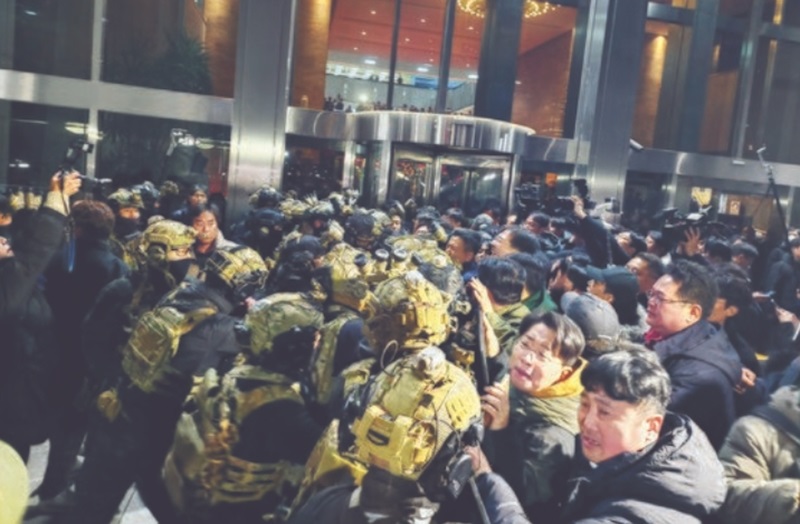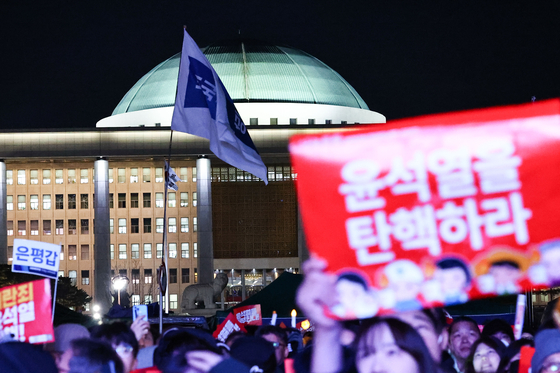South Korea, the home country of millions of Korean expatriates in the United States, is undergoing a period of political upheaval following President Yoon Suk Yeol’s unexpected declaration of emergency martial law last week.
This controversial move, reminiscent of South Korea’s authoritarian past, triggered swift resistance from lawmakers, citizens, and even members of Yoon’s own party. While President Yoon narrowly avoided impeachment, his authority remains in jeopardy as prosecutors launch a criminal investigation into charges of treason and abuse of power.
A Shocking Declaration of Martial Law
At around 10:30 p.m. on December 3, President Yoon made an unannounced televised address, proclaiming martial law for the first time in 44 years. Yoon framed the declaration as a response to an “imminent threat” posed by “pro-Pyongyang antistate forces” that he claimed sought to undermine South Korea’s constitutional order. “Through emergency martial law, we will rebuild and protect the free Republic of Korea, which is falling into ruin,” Yoon declared in his live broadcast.
Soon after, Army Chief of Staff Gen. Park An-su was appointed martial law commander and immediately implemented sweeping measures. All political activities by the National Assembly, local governments, and political parties were suspended. Demonstrations, rallies, and activities deemed to incite unrest were banned, and media outlets were placed under strict control. Those who violated martial law could be arrested without a warrant.
As news of the martial law spread, hundreds of citizens gathered outside the National Assembly to protest the decree. Around 280 soldiers, identified as martial law forces, descended on the parliamentary compound via helicopter, facing strong resistance from citizens and parliamentary aides who barricaded the entrances to the Assembly’s main chamber. The soldiers were reportedly under orders to arrest lawmakers, but resistance from the public and lawmakers’ aides stalled the operation. Some lawmakers, including those from the opposition and even members of Yoon’s own People Power Party, scaled walls and slipped through crowds to enter the chamber.
The turning point came when on-scene commanders admitted they believed it was unconstitutional to arrest lawmakers or interfere with legislative activities, even under martial law. This act of restraint prevented a violent confrontation inside the National Assembly.

Parliament Overturns Martial Law
While citizens and aides blocked the entrance to the Assembly, lawmakers convened an emergency session. At around 1 a.m. on December 4, the National Assembly unanimously passed a resolution to annul the martial law decree. All 190 lawmakers present voted in favor of the motion, including 18 members of Yoon’s own party.
The resolution’s passage demonstrated the strength of South Korea’s democratic institutions, with ruling and opposition parties uniting to protect legislative independence.
National Assembly Speaker Woo Won-shik declared the martial law “null and void” and called on police and military forces to immediately withdraw from parliamentary grounds. “Be at ease,” Woo told the public, pledging to protect democracy. Hours later, at 4:22 a.m. on December 4, the Joint Chiefs of Staff announced the withdrawal of troops from the Assembly.
Six hours after the passage of the Assembly’s resolution, Yoon reversed course. At 4:27 a.m., he delivered a second televised address announcing that martial law had been lifted. His explanation for the abrupt decision blamed political conflict between his administration and the opposition Democratic Party (DP), which had recently pushed a downsized budget bill and submitted impeachment motions against key administration officials.
While Yoon’s retreat from martial law prevented immediate escalation, the political crisis was far from over. His critics accused him of overreach and called his martial law decree a blatant violation of the Constitution.
Impeachment Motion and Political Fallout
In the days following the martial law fiasco, opposition lawmakers ramped up efforts to remove him from office. On December 7, the National Assembly convened to vote on an impeachment motion against Yoon.
The motion cited Yoon’s violation of constitutional, martial, and public official laws, as well as treason, for his role in the martial law declaration. However, the vote fell short due to a deliberate walkout by Yoon’s own PPP party lawmakers.
National Assembly Speaker Woo Won-shik announced that only 195 ballots had been cast, five votes short of the 200 required to open counting. Since impeachment requires two-thirds of the 300-member Assembly to pass, the motion failed.
PPP floor leader Choo Kyung-ho, a close ally of Yoon, led the walkout, ensuring that the impeachment vote would not meet quorum. However, some PPP lawmakers, including Ahn Cheol-soo and Kim Sang-wook, broke from the party line, voting in favor of the motion.
Despite the failed impeachment attempt, DP leader Lee Jae-myung vowed to continue efforts to remove Yoon from office. “Korea’s worst risk is President Yoon,” Lee declared, pledging to “return this country to normal by Christmas” as a “gift” to the nation. Prominent political figures, including Seoul Mayor Oh Se-hoon and Daegu Mayor Hong Joon-pyo, called for Yoon to resign voluntarily, advocating for a nonpartisan emergency Cabinet to stabilize the country.
Within Yoon’s PPP party, support for constitutional reform grew, with some members advocating for an end to South Korea’s single-term, five-year presidency in favor of a four-year, two-term system. Such reforms would aim to balance presidential power and strengthen oversight.

Criminal Investigation of President Yoon for Treason Charges
While Yoon narrowly avoided impeachment, the legal consequences of his actions were only beginning. On December 6, prosecutors launched a formal criminal investigation into Yoon, booking him as a suspect for treason and abuse of power. Under South Korea’s Constitution, treason charges are exempt from presidential immunity, allowing prosecutors to pursue criminal charges against a sitting president.
The investigation also targeted former Defense Minister Kim Yong-hyun, who allegedly advised Yoon to declare martial law. Kim was dismissed from his post on December 5 but was arrested three days later. He was accused of exercising powers as a martial law commander despite having no formal authority to do so. Prosecutors accused Kim of spearheading the martial law declaration and attempting to destroy evidence by replacing his phone after the crisis.
Police and prosecutors intensified their investigations, with the National Office of Investigation forming a 150-member task force to probe officials linked to the martial law decree. Police raided Kim’s residence and office, seizing phone records and other evidence. While police and prosecutors initially disputed jurisdiction, the Corruption Investigation Office for High-ranking Officials (CIO) called for a unified investigation to avoid overlap.
South Korean prosecutors emphasized that the investigation would be conducted “swiftly and thoroughly,” with no consideration for Yoon’s position as president. The Presidential Security Service is also under scrutiny for its possible role in the martial law decree.
Resilience of South Korea’s Democracy
The martial law crisis and subsequent impeachment efforts highlighted the resilience of South Korea’s democracy. Unlike past military regimes, where martial law often signaled the start of authoritarian rule, today’s South Korea responded with strong, lawful resistance. Citizens and lawmakers from across the political spectrum opposed Yoon’s decree, while military commanders defied orders to arrest lawmakers.
The National Assembly’s unanimous decision to annul martial law within hours of its declaration underscored the strength of South Korea’s democratic institutions. The swift withdrawal of troops and the passage of a resolution to lift martial law were symbolic victories for the rule of law.
Although Yoon remains in office, he faces significant political and legal challenges. Calls for his resignation have intensified from both opposition and ruling party members. The criminal investigation against him raises serious questions about presidential power and constitutional safeguards.
The martial law debacle serves as a stark reminder of South Korea’s fraught history with military rule. However, unlike past authoritarian regimes, South Korea’s democratic institutions—its legislature, judiciary, and civil society—stood firm. The incident revealed the enduring power of the National Assembly, the independence of prosecutors, and the willingness of citizens to stand up for democratic principles.
As South Korea moves forward, the legal and political consequences of this crisis will undoubtedly shape the nation’s future. But for now, the swift response of lawmakers, prosecutors, and citizens alike affirms that democracy remains deeply rooted in South Korea’s political culture. The martial law crisis, though chaotic and unprecedented, showcased the nation’s capacity to uphold the rule of law, even in moments of extreme uncertainty.
By Mooyoung Lee lee.mooyoung@koreadaily.com


![Deeper-I, Efinix sign deal to develop world’s first AI-FPGA single-chip solution Ikuo Nakanishi, left, vice president of sales at Efinix and Lee Sanghun, right, CEO of Deep-I pose for a photo after signing MOU on March 26. [Provided by Deeper-I]](https://www.koreadailyus.com/wp-content/uploads/2025/04/0401-DeeperI-100x70.png)

